Living Energy Farm
by Linda Salisbury
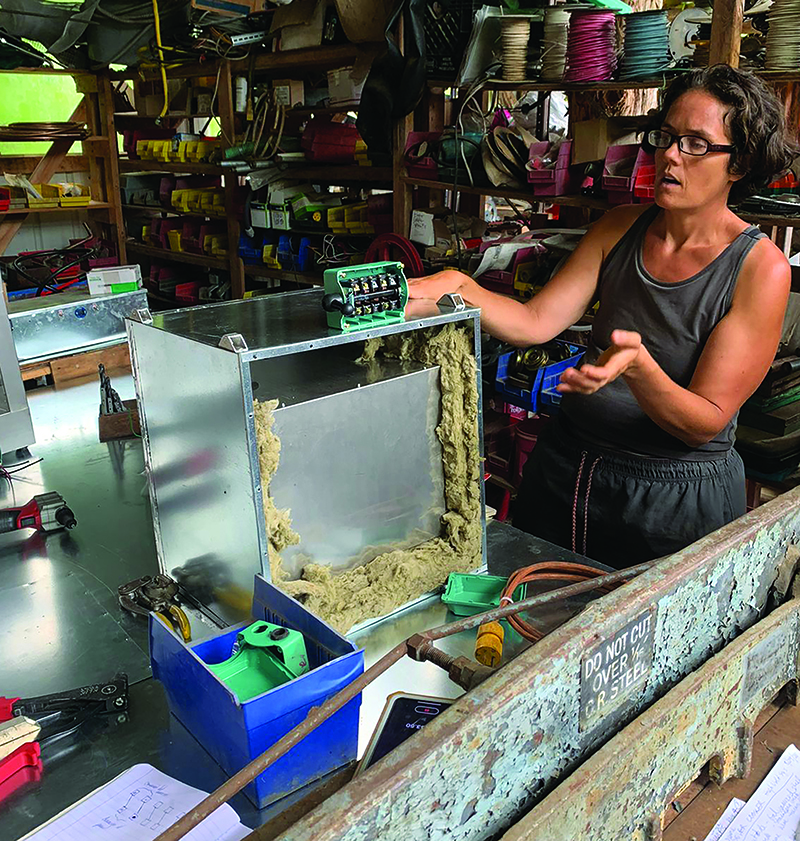
At a 2023 workshop, Debra Piesen demonstrates making an insulated solar electric cooker. These were developed in cooperaation with California Polytechnic and are used for about 70 percent of LEF’s cooking (photo courtesy of LEF).
Alexis Zeigler, founder of Living Energy Farm (LEF) in Louisa County, uses his expertise to promote respect for the earth and self-sufficiency by developing and using technology to live with green energy rather than fossil fuels, and it works. LEF’s community extends well beyond the farm. It is helping in areas around the world where power and resources are limited.
Founded in 2010, LEF is an intentional community, which is a group of like-minded resourceful people who have a common purpose and share resources.
As he and others were contemplating creating LEF, Ziegler explained that “we asked, how do we power our lives with renewables?” And what type of lifestyle “can we sustain on a modest renewable energy budget?”
The answer became clear: they wanted houses that were warm in the winter and cool in the summer, appliances, and the ability to charge their devices.“What makes this possible is the magic of cooperative living,” Ziegler said, combined with design principles of a DC microgrid, timing of energy use, and “living within the rhythm of the sun.”
“We teach people how to run existing tools and appliances on direct drive solar electric (straight from photovoltaic panels), as well as developing new appliances,” he explained. “That latter category includes Insulated Solar Electric Cookers (a project developed in cooperation with one at California Polytechnic) and a washing machine.”
The small community is located on 127 acres along Bibb Store Road outside the town of Louisa. The number of self-reliant residents in LEF averages eight to twelve (currently there are four adults and four children). Sometimes guests wanting to experience the community and its innovations stay for a few days. Members have their own living space in the house but share areas like the kitchen built outside the main building with a breezeway connecting them.
LEF, surrounded largely by a neighbor’s corn fields and forests, uses five of its own acres to grow organic crops, orchards, a wide variety of vegetables, seeds, and ducks The key purpose of the farm is to live “off the grid” with the goal of becoming “completely energy self-sufficient on the resident level using a setup that has been running with very low maintenance costs (in terms of time and money) for many years,” Zeigler wrote in an article.
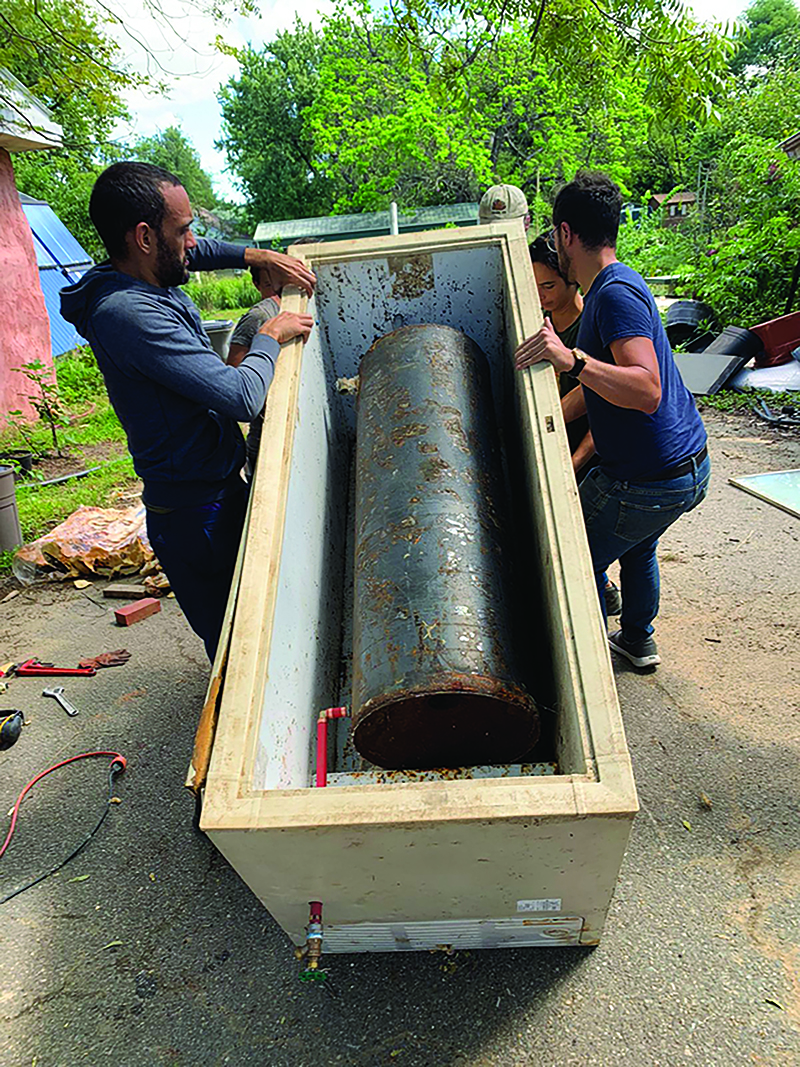
At a workshop, attendees from Puerto Rico learn to build solar hot water batch collectors from old water tanks and discarded refrigerators (photo courtesy of LEF).
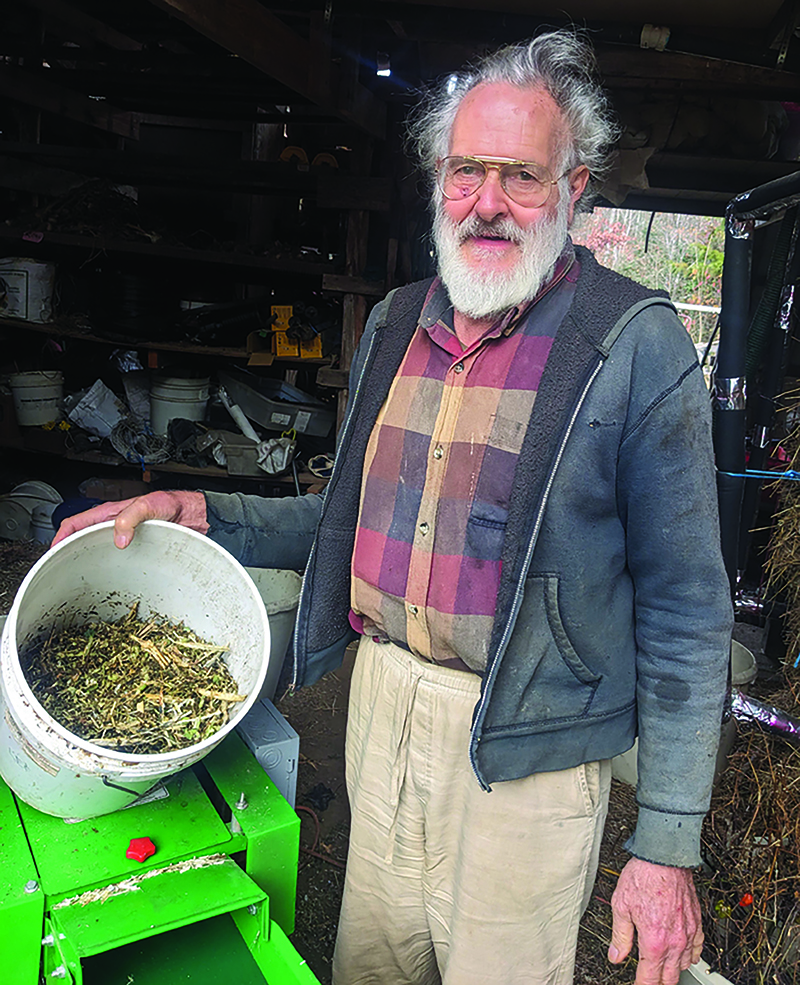
Thomas “Otto” Ottoman prepares organic materials to be fed into the biogas digester. LEF cooks about 30 percent of its food with biogas and has started running farm tractors with it (photo courtesy of LEF).
Aside from the farming that provides food and the sale of seeds and crops, LEF shares its technology across the U.S. and around the world. Puerto Rico is one example. In “Puerto Rico, we have been working with several organizations there including El Departmento de la Comida and Fundacion Bucarabon,” Ziegler explained. “Our primary focus has been on education and setting up solar kits in community centers. We have also set up some solar kits on farms, as well as distributing a number of solar refrigerators that do not use batteries.
“We have also done a number of training programs, both in Puerto Rico and by bringing Puerto Ricans to LEF,” he continued. “We do at least one intensive training program each summer; sometimes more than that. The training programs have included lots of people from the surrounding area, as well as people from all over (Europe, Africa, India).” He added that they have also been working with the University of Missouri and USAID on a simplified combine harvester.
Ziegler explained that their plant-based diet is based on only a few crops: corn, wheat, beans, spring potatoes, sweet potatoes, and various types of squash. They also grow corn and wheat for the ducks who then reward LEF with eggs. Their orchard provides various nut trees, persimmons, kiwis, peaches, and pears. The produce is eaten, sold, or stored by fermentation, drying, and canning.
“We discuss the work that needs to be done, and everyone has some areas of management and specialty,” he said. “One person might manage certain aspects of the farm (such as certain seeds crops), but then other people help with harvesting and processing, particularly at the peak of the season.”
Largely self-taught, Zeigler is an engineer, builder, mechanic, author, orchardist, farmer, machinist, and carpenter. He and community members use a building technique that is centuries old but not commonly used in modern structures: strawbales for insulation that are stacked within the frame of the building and plastered over. They set the windows on the south side of the building to take advantage of winter heat and summer cooling.
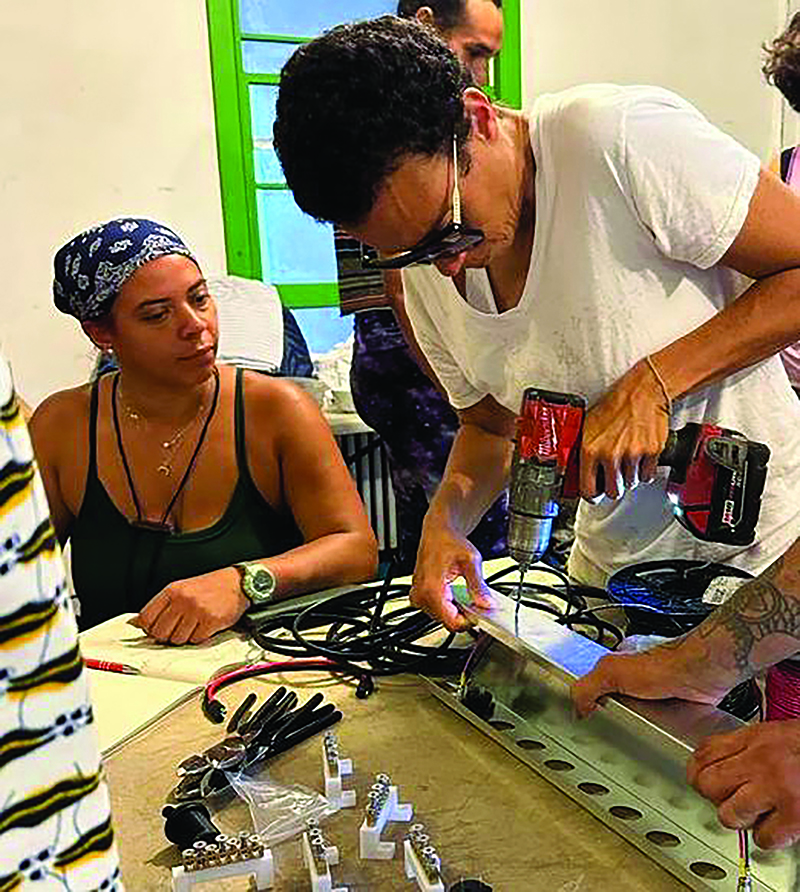
Afia Walkingtree at Solidarity Yaad in Jamaica uses a direct drive solar refrigerator that came from LEF. Solar refrigerators run without batteries (photo courtesy of LEF).
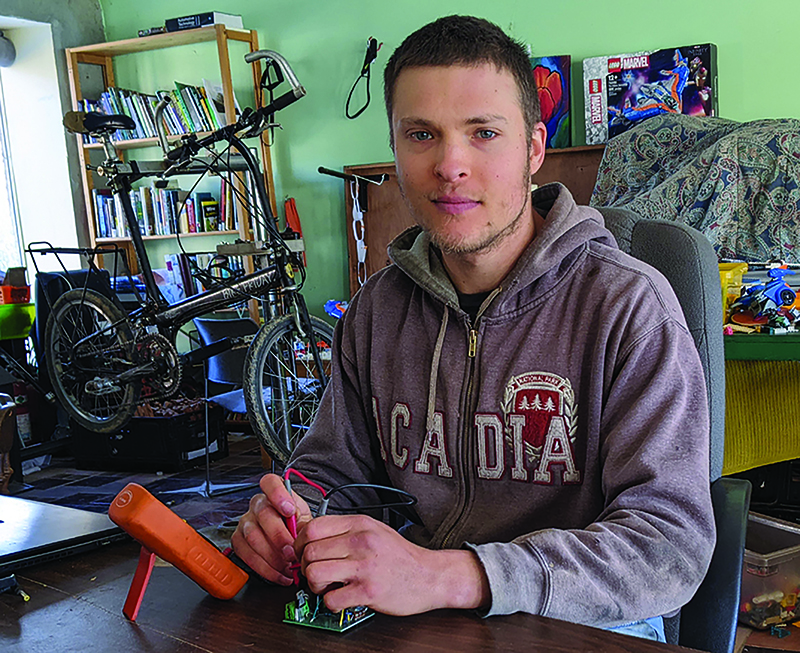
David Rosenberg works at his desk
(photo courtesy of LEF).
Zeigler added that what makes LEF different than other off-grid communities is that its energy is stored in “forms other than electricity, allowing us to function with smaller solar panel rigs than are possible with conventional systems.” For example, on sunny days, solar hot air collectors on the roof heat air that is blown under the floor so it can radiate up through the house. Cross ventilation is essential. Appliances and shop tools get DC power directly from panels during the day. Cellphones and lights are powered from batteries.
The house has access to the internet and plentiful hot showers. And unlike most homes and buildings, the LEF community pays only about $25 a year for energy use.
Living on the farm in an intentional community means being willing to adjust to this special lifestyle and work hard. Zeigler himself understands community living. Raised in Georgia, his multi-generation family lived and worked together on a farm. He developed a skill-set to meet the work involved, including fixing things that were broken.
After moving to Louisa County, he and his wife, Debbie Pieson, lived for a time at Twin Oaks, another intentional community in the county. They eventually decided, along with some other people, to buy the LEF acreage. The concept attracts members, visitors, interns and others who attend his green building workshops.
David Rosenberg discovered LEF about 18 months ago through the Foundation for Intentional Communities website. “I had been essentially based in the intentional community Verdenergia Pacifica in Costa Rica for the past few years, spending a few months here and there at a couple other communities,” he explained. “I was looking for a community where I could employ my technical and design skills and learn new ones while also being financially stable. LEF is pretty unique in being serious about both self-sufficiency and innovation, so that was a significant draw. I also like the strong sense of purpose.”
Living at LEF hasn’t been a drastic change from Verdenergia, but the most notable differences for Rosenberg have been living with a more temperate climate and being with the same group of people continuously. “I have taken on an eclectic array of projects, but my primary concerns have been experimental electronics and developing a DC washing machine,” he said. “Besides working in the seed business, I have been learning a great deal about circuitry, machining, and farming, which is all very exciting.”
Recent LEF members include Chrissy Billeiter and her two young children. She had been investigating intentional communities for several years, but after learning about LEF, she said, “I realized this place really knew how to live authentically.” She and her two children traveled from Texas to purchase one of LEF’s DC refrigerators. That trip changed everything for her.
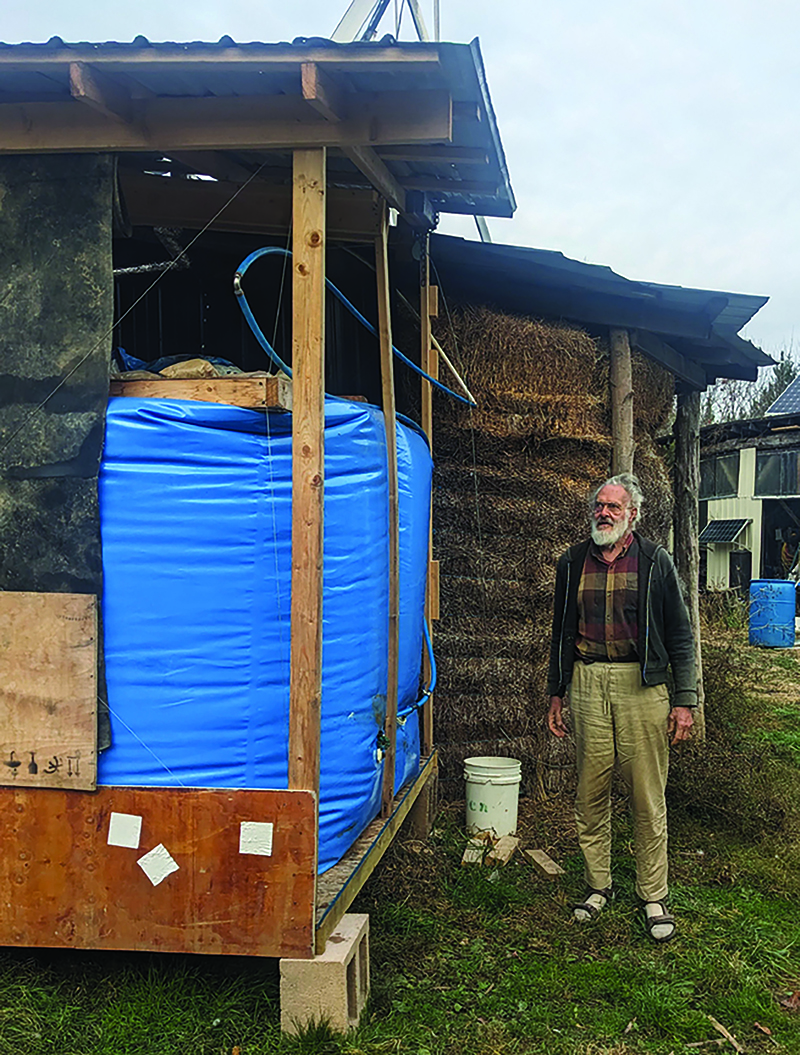
Thomas “Otto” Ottoman takes care of the biogas digester dubbed “Seymour.” The digester has a 2,000-gallon tank. The blue bag is the biogas storage bag (photo courtesy of LEF).
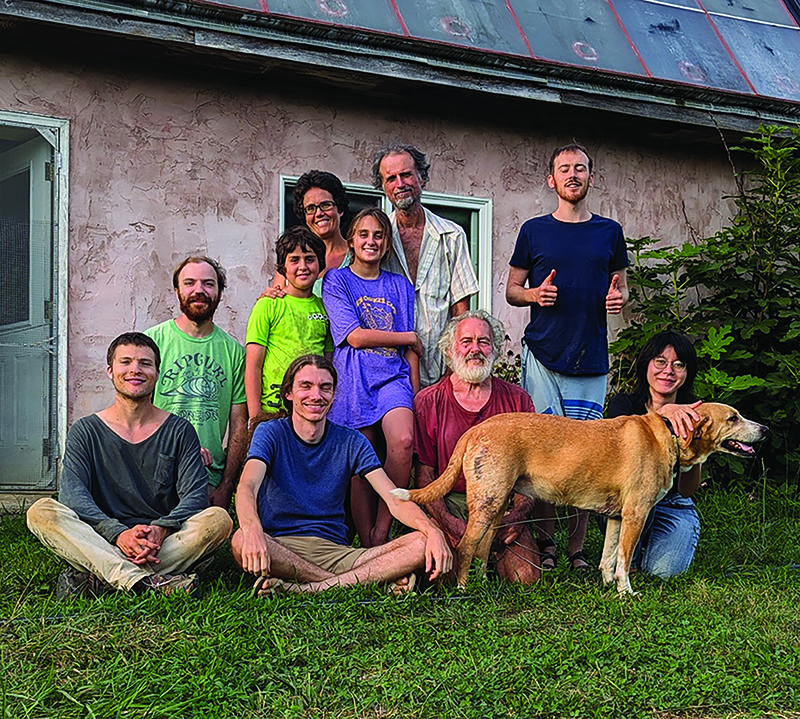
Members of LEF and interns pose with Mittens the dog (photo courtesy of LEF).
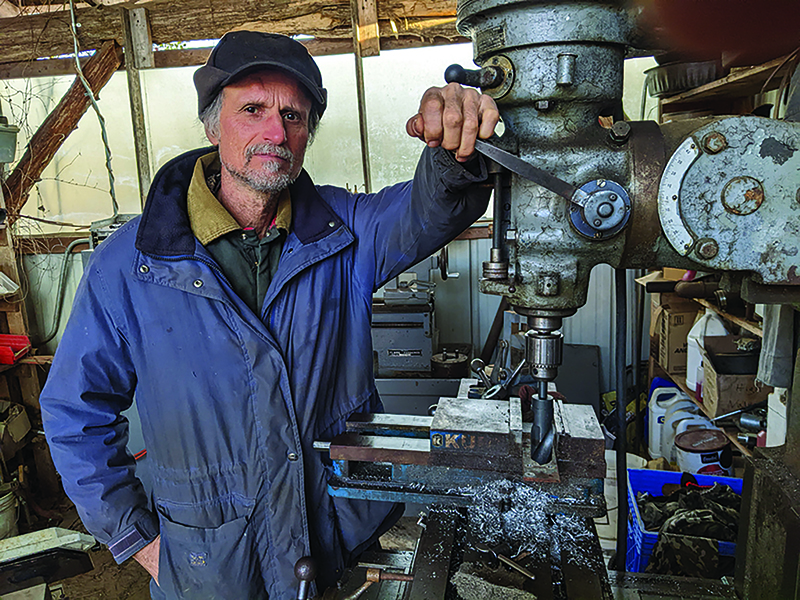
Alexis Zeigler, founder of Living Energy Farm, stands with his left hand on a milling machine. In the background is a lathe for cutting round metal (photo courtesy of LEF).
“I was overcome with a sublime sense of belonging, comfort, and security while visiting LEF,” Billeiter recalled. “It was everything I had been looking for and working towards: off-grid, sustainable, and full of loving, like-minded people.” She decided to move her family to LEF in October 2024.
“There was not much of a lifestyle change involved, except getting used to sun-powered electricity instead of grid power,” she explained. “I am simply more mindful of power consumption during cloudy spells and keep a closer eye on the weather. Learning the different systems at LEF was enjoyable (solar ovens, biogas, direct solar appliances), and I was already used to composting toilets.”
“I don’t have a specific set of specialized skills, but have a variety of skills gained through experience and am adding more skills as I become more involved in the systems and technology at LEF,” Billeiter added. “One of my primary areas of focus is learning more about the seed-saving business that we run on the farm.”
Even though their operations include farming, LEF is anything but another local farm. “We are organizing our lifestyle in a manner that is affordable on a global scale,” Zeigler emphasized. “We are advocating a globalist vision.” LEF has planted that seed, and it’s growing.
For information or to contact Alexis Zeigler, visit www.livingenergyfarm.org.

